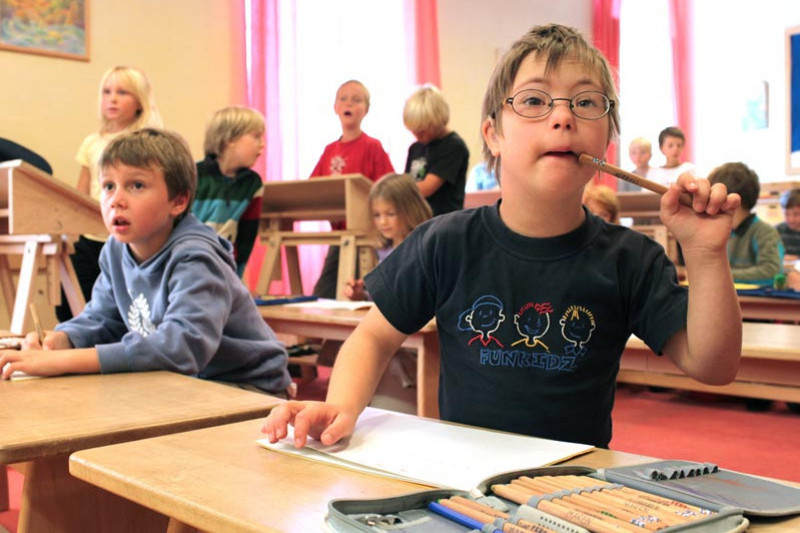Project “Dental Care for the Disabled” at the University of Witten-Herdecke Wins NRW Health Prize

Dental care for multiply disabled or severely disabled individuals is a special challenge, and for the disabled person receiving treatment it can be an especially stressful situation. In Germany, only very few dentists have training in how to best treat disabled patients. As a part of a project on “Dental Care for the Disabled”, the University of Witten-Herdecke established an academic chair for this type of dentistry and treats disabled persons in institutions in the area. The project is supported by the Software AG Foundation. For their work, the university was awarded the Nordrhein-Westfalen Health Prize 2015, which includes an award of 3,000 euros. We spoke with Prof. Dr. Stefan Zimmer, head of the department for Dental Medicine at the University of Witten-Herdecke
Dear Professor Zimmer, congratulations on winning the health prize for your project on dental care for disabled. What were the reasons that prompted the University of Witten-Herdecke, shortly after its founding, to focus on the field of special care?
Since its founding it has been important to the university not to limit itself to teaching, research, and direct patient care, but beyond that also to be active in society and to contribute to general wellbeing. In this spirit, it was recognized that individuals with disabilities have a disadvantage in dental prevention and dental care. That's why the UW/H wanted to be, and wants to be, a resource for this group of people.
What is the special challenge in offering dental and medical care to persons with disabilities?
People with disabilities need considerably more attention, when it comes to dental prevention and treatment, than people without disabilities. Furthermore, they don't come alone to treatment, but are often accompanied by a concerned relative, who must also be treated with a great deal of attention and empathy. One needs considerably more time and skill in order to build trust - which is a prerequisite for examination and treatment. The dental treatment in and of itself also requires considerably more time, as individuals with disabilities are limited in their ability to participate in the treatment. They can handle less stress, they are less patient, and some even have to be treated in their wheelchair instead of in the dental chair. Often, one realizes after a considerable and lengthy attempt that treatment in a wake state is not possible after all, and that general anesthesia is requires - which we have to do in about 800 cases per year. Because some syndromes also involve the mouth, there is often a particularly difficult dental situation, and this places special demands on the dental practitioner.
What skills does a dentist need when treating persons with disabilities?
One needs patience and empathy above all - and cannot be afraid of contact with people with disabilities. These are the fundamental basics that we transmit to our students. Furthermore, one needs to know the special medical considerations, especially when a patient has a syndrome that is not only relevant for the dental treatment, but which as a general medical condition often also has special treatment risks. As our students complete this special training in the course of their degrees, at the end of the degree program, in addition to the state examination certification, they also receive a special certificate that proves their qualification in the area of treating people with disabilities.
In what way is UW/H taking a leading role in this regard - and what impulses do you hope to set in research, in medical practice, and society with the “Dental Care for the Disabled” project?
The chair for dental care for the disabled is the first and only one of its kind in Germany or in German-speaking areas. In this way we are taking a leading role in teaching, because we are the only ones who can offer a high-quality academic and practical training in this field. In terms of treatment, too, we do quite a lot: we treat about 1,800 patients per year in disabled dental care. As far as I know that makes us the largest treatment center for disabled-oriented dental medicine in Germany. What we would like to intensify with the academic chair, however, is research and the academic development of the field. We appointed a renowned expert in this field, Prof. Dr. Andres Schulte, who came to us from Heidelberg. This gives us the possibility to attract young researchers to the field, to supervise dissertations and habilitation theses, and furthermore - and most importantly - to lay the foundation for developing better dental care for persons with disabilities.
On the subject of financing: The Software AG Foundation and the Mahle Foundation made the academic chair possible. How important is the support of these foundations?
Without the support of foundations, especially the Software AG Foundation, it wouldn't have been possible to establish this chair. We are very thankful to our supporters for their commitment.
Thanks for the discussion!
